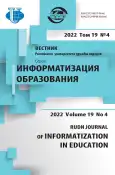Integration of assignments for students of a pedagogical university on the usage of information technologies in teaching schoolchildren
- Авторлар: Shunina L.A.1, Grinshkun A.V.1
-
Мекемелер:
- Moscow City University
- Шығарылым: Том 19, № 4 (2022)
- Беттер: 328-339
- Бөлім: ICT SKILLS AND COMPETENCIES AMONG TEACHERS
- URL: https://journal-vniispk.ru/2312-8631/article/view/321296
- DOI: https://doi.org/10.22363/2312-8631-2022-19-4-328-339
- ID: 321296
Дәйексөз келтіру
Толық мәтін
Аннотация
Problem statement. The authors describe approaches to the integration of assignments for students of a pedagogical university on the usage of information and telecommunication technologies in the professional activity of a teacher. This study is a continuation of the authors’ recent research of issues related to modeling approaches to the integration of methodical systems for the training of future teachers based on cloud technologies (on the example of International Baccalaureate schools). The purpose of the study is to obtain a practical confirmation of the effectiveness of the proposed approaches to the integration of the content of academic disciplines through practical tasks. Methodology. A pilot study consisting of several stages was conducted. The goals, objectives and content of practical works offered to students of a pedagogical university within the framework of studying a number of disciplines were analyzed, opportunities for their integration were identified. Control and experimental groups (16 people each) of pedagogical university students were formed. The participants of the experimental group were offered to perform specially designed practical assignments, which required knowledge and skills of disciplines integrated into the content. Results. The study found that the integration of assignments for students of a pedagogical university on the usage of information and telecommunication technologies in teaching schoolchildren contributes to the effectiveness of the formation of professional competence of such teachers. Conclusion. The effectiveness of the integration of assignments for students of a pedagogical university on the usage of information and telecommunication technologies in the professional activity of a teacher has been experimentally proved, positive aspects of such integration have been identified.
Авторлар туралы
Lyubov Shunina
Moscow City University
Хат алмасуға жауапты Автор.
Email: shuninala@mgpu.ru
ORCID iD: 0000-0002-6952-000X
Candidate of Pedagogical Sciences, Head of the Department of Informatization of Education, Institute of Digital Education
29 Sheremetyevskaya St, Moscow, 127521, Russian FederationAlexander Grinshkun
Moscow City University
Email: grinshkunav@mgpu.ru
ORCID iD: 0000-0003-3882-2010
Candidate of Pedagogical Sciences, Associate Professor of the Department of Informatization of Education, Institute of Digital Education
29 Sheremetyevskaya St, Moscow, 127521, Russian FederationӘдебиет тізімі
- Samylkina NN. Methodical system of advanced computer science education based on an integrative approach (Doctor of Pedagogical Sciences dissertation). Moscow; 2021. (In Russ.)
- Grevtseva GYa, Tsiulina MV, Bolodurina EA, Bannikov MI. Integrative approach in the educational process of the university. Modern Problems of Science and Education. 2017;(5). (In Russ.) Available from: https://science-education.ru/ru/article/view?id=26857 (accessed: 01.06.2022).
- Bezrukova VS. Integration processes in pedagogical theory and practice. Yekaterinburg; 1994. (In Russ.)
- Belkin AS. Competence. Professionalism. Mastery. Yekaterinburg; 2004. (In Russ.)
- Danilyuk AYa. Metamorphoses and prospects of integration in education. Pedagogy. 1998;(2):8. (In Russ.)
- Chapaev NK. Pedagogical integration: methodology, theory, technology. Yekaterinburg, Kemerovo; 2005. (In Russ.)
- Zverev ID, Maksimova VN. Interdisciplinary connections in a modern school. Moscow: Pedagogy Publ.; 1981. (In Russ.)
- Shunina LA. Digital educational resources in the activities of teachers working under International Baccalaureate programs. Horizons and Risks of Education Development in the Context of Systemic Changes and Digitalization: A Collection of Scientific Papers of the XII International Scientific and Practical Conference (Moscow, 25 January 2020) (part 1). Moscow: International Academy of Sciences of Pedagogical Education; 2020. p. 316-319. (In Russ.)
- Shunina LA. The usage of cloud technologies in the joint work of university teachers as the basis for integrated teacher training for international Baccalaureate schools (Candidate of Pedagogical Sciences dissertation). Moscow; 2020. (In Russ.)
- Vorobeva NA, Gazaryan IZ, Grinshkun VV, Knyazeva EN, Kondakov AM, Miruk MV, Muzychenko YuS, Usova NA, Ustinova MV, Fedenko LN, Shaginyan ML. Mechanisms of implementation and organizational support of the professionally-oriented International Baccalaureate Career-Related Program (IB CP): methodological guide. Moscow: Beliy Veter Publ.; 2021. (In Russ.)
- Bocharov MI, Usova NA, Zhigunova AA. Information-analytical system of support the integration of curricular and extracurricular activities of students based on international experience in the conditions of implementation of the programme “Digital Economy of the Russian Federation.” Bulletin of the Moscow City University. Series: Informatics and Informatization of Education. 2019;(1):53-60. (In Russ.)
- Grinshkun V, Usova N. Use of the hardware and software complex “Moscow Electronic School” in training teachers working under the International Baccalaureate programmes. Journal of Siberian Federal University. Humanities & Social Sciences. 2019;9(12):1622-1634.
- Grigoryan YaG. Requirements for the professional competence of the International Baccalaureate teachers. Innovations in Education. 2016;(11):29-41. (In Russ.)
- Nikonorova EI. Application of innovative resources for individualization of education in the “International Baccalaureate” system in the conditions of informatization of education. In: Grinshkun VV. (ed.) Informatization of Continuing Education (ICE-2018): Materials of the International Scientific Conference (Moscow, 14-17 October 2018) (vol. 1). Moscow: RUDN University; 2018. p. 639-645. (In Russ.)
- Hacking EB, Blackmore C, Bullock K, Bunnell T, Donnelly M, Martin S. International Mindedness in practice: the evidence from International Baccalaureate schools. Journal of Research in International Education. 2018;17(1):3-16. https://doi.org/10.1177/1475240918764722
- Soboleva EV, Suvorova TN, Grinshkun AV, Nimatulaev MM. Formation of group creative thinking when working with virtual walls. European Journal of Contemporary Education. 2021;10(3):726-739. https://doi.org/10.32744/pse.2021.3.33
Қосымша файлдар









